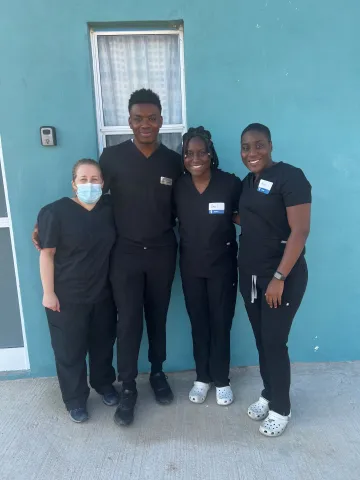SNPhA Partners with health organizations to provide services in Mexico

Pearl Craig, a third-year pharmacy student, and other students representing the UArizona chapter of the Student National Pharmaceutical Association, facilitate monthly pharmacy operations at the Rocky Point Medical Clinics in Puerto Penasco and Sonoyta, Mexico.
The Student National Pharmaceutical Association (SNPhA) volunteers monthly to provide healthcare services at the Rocky Point Medical Clinics in Puerto Penasco and Sonoyta, Mexico. Pearl Craig, a third-year pharmacy student, is the SNPhA Chapter President and talks about their service efforts in Mexico.
Question: Could you please describe SNPhA's community outreach efforts in Mexico?
Answer: The Rocky Point Medical Clinics in Puerto Penasco and Sonoyta, Mexico, are a service initiative that SNPhA (Student National Pharmaceutical Association) volunteers with on a monthly basis. These clinics are organized in collaboration with volunteers from the UArizona College of Medicine's Commitment to Underserved People (CUP) program, the undergraduate club MexZona, and local volunteers. SNPhA's involvement in these clinics primarily focuses on pharmacy operations. Our Tucson Community Outreach Coordinator, Grace Sisk, brought this opportunity to the attention of the former SNPhA chapter president, Precious Craig. Since January, SNPhA has been actively partnering with the organization to support the clinics. This collaboration aligns with SNPhA's mission of serving the underserved, fostering interprofessional collaboration, and gaining exposure to international medical practices. It represents a significant contribution to the community and the enhancement of healthcare services in the region.
Q: Who are the student volunteers?
A: For this past October clinic - Grace Sisk, Derrick Nwobodo, and Tyler Sedig. For the September clinic, it was myself, Precious Craig, Kimberly Osborn and Derrick Nwobodo. Students who have volunteered from the last school year were Grace Sisk, Precious Craig, Kimberly Osborn, David Elias Campa, Jose Dominguez, and Stephen Dahn.
Q: What do you all do when you arrive at the clinic? What is the goal?
A: At the clinic, SNPhA Pharmacy volunteers facilitate pharmacy operations under the supervision of a pharmacist or physician. This involves sorting donated medications, filling, preparing, and dispensing prescription medications to patients based on clinic-issued prescriptions. Additionally, we provide patient education and medication counseling using interpreters.

Pharmacy students also collaborate with pharmacists and physicians to make therapeutic interchange suggestions. The overarching goal of this initiative is to provide healthcare services to the underserved communities of Puerto Penasco, Mexico, particularly in an extremely underserved part of the city where many patients have limited access to affordable medical care. Ultimately, the aim is to expand access to care for these patients while allowing students to gain valuable insights into global health issues.
Q: Who do you typically serve?
A: Patients in the underserved areas of Puerto Penasco.
Q: What organizations do you partner with for this outreach?
A: The clinics are held in conjunction with volunteers from UArizona College of Medicine’s Commitment to Underserved People (CUP) program, the undergraduate club MexZona, and is facilitated by local volunteers. More recently medical providers have been volunteering the Christ Church of the Valley (CCV) medical mission trips.
Q: Why do you and your organization believe it is important to do this outreach?
A: As an organization, we believe this outreach is important because it directly aligns with SNPhA’s mission of tackling healthcare disparities and minority underrepresentation in healthcare fields. One of our objectives is to plan and execute programs that enhance the health and social environment of minority communities. While Puerto Penasco may not be part of our immediate community, it is a destination frequented by U.S. tourists. These clinics not only give back to the local community but also serve as an educational opportunity for students, exposing them to vital healthcare issues in a global context.

